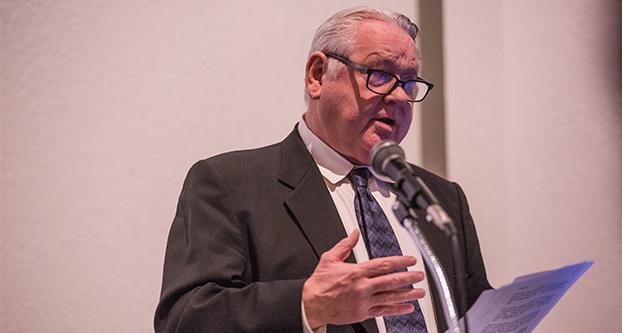Fresno State journalism professor Jim Boren, retired executive editor of The Fresno Bee, gave listeners a peek into his 40 years in the industry on Tuesday.
Boren discussed some of the highlights of his career, like the time in 1988 when George H.W. Bush visited Fresno and Boren got the chance to pose a question to him.
Boren asked Bush to discuss how he felt about the Armenian Genocide and Turkey’s role in it. Bush answered that Turkey should take responsibility for the genocide of Armenians. As a result of his reporting, Boren said, Bush’s answer on the issue was documented and used as a reference for others for years to come.
Boren retired from The Bee in January 2018 and began teaching courses in Fresno State’s media, communications and journalism department. In 2016 and 2017, he was also involved in the decision-making process for the Pulitzer Prizes.
Boren said his involvement in journalism stemmed from an interest in athletics. While attending Hoover High School, he became a sports reporter. He began reporting for The Fresno Bee at the age of 19, even before completing his bachelor’s degree from Fresno State, he said.
His talk on Tuesday in the Satellite Student Union, titled “A journalist’s reflections: what I’ve learned in four decades in the news business,” was organized by the Osher Lifelong Learning Institute, a Fresno State program geared toward people aged 50 and older who are interested in learning for leisure.
In his career, Boren had the opportunity to meet Nelson Mandela, a South African politician who actively fought against racial segregation in that country.
“I think he was very proud of the fact that he got to do some in-depth interviewing of Mandela,” said attendee Vonny Sturgeon. “I think he wanted his audience to know how important that was.”
Boren also discussed how journalism has evolved over time. He explained that more people choose to read news online nowadays, which has contributed to the decline in the popularity of print newspapers.
Boren said although some people still prefer print, the shift to digital journalism has its advantages. Online news stories can be more up-to-date and encompass more advanced features than printed stories, he said.
“You’ve got text. You’ve got photo. You’ve got video. You’ve got animation,” Boren said. “You’ve got graphics that you can present in a very accessible way to your readers, so you can tell the story much better.”
Boren encouraged attendees to support the journalism industry by purchasing subscriptions to the publications they like to read.
He said, “Please be willing to pay for the content you enjoy.”
Boren added that local news publications touch on issues that larger publications do not, giving them more of a special purpose in the the community.
“Who else is going to tell you about what’s happening in your school district, your city council and how much your roads are costing?” Boren said. “You’re not going to get that on CNN or [in the] New York Times.”
After his speech, Boren answered questions from the audience on journalism as well as his career and The Fresno Bee.
Attendee David Grubbs, a Fresno State professor emeritus of biology, said he is fond of The Fresno Bee for presenting readers with objective reporting on a spectrum of issues.
“They tackle a lot of difficult issues in a very fair way from both sides,” Grubbs said. “There’s got to be a difficult balance that has to be achieved between several different sides. And I think The Bee has always been courageous.”




